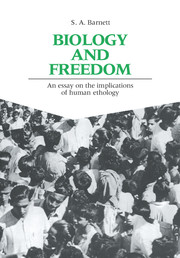Book contents
- Frontmatter
- Contents
- List of illustrations
- Preface
- Acknowledgements
- Part 1 An introduction
- Part 2 Homopugnax: the violent species
- Part 3 Homo egoisticus: the selfish species
- Part 4 Homo operans: the greedy species
- Part 5 Homo sapiens: the human species
- 12 The reductionist imperative
- 13 Human communication
- 14 Teaching and tradition
- 15 The question
- Glossary
- Notes
- References
- Name index
- Subject index
14 - Teaching and tradition
Published online by Cambridge University Press: 04 August 2010
- Frontmatter
- Contents
- List of illustrations
- Preface
- Acknowledgements
- Part 1 An introduction
- Part 2 Homopugnax: the violent species
- Part 3 Homo egoisticus: the selfish species
- Part 4 Homo operans: the greedy species
- Part 5 Homo sapiens: the human species
- 12 The reductionist imperative
- 13 Human communication
- 14 Teaching and tradition
- 15 The question
- Glossary
- Notes
- References
- Name index
- Subject index
Summary
Hast thou comprehended the breadth of the earth?
Declare if thou knowest it all.
Job: 38:18Mathematics, music, morality and speech are easily seen as novelties that emerged with the human species. But they would hardly exist without yet another novelty, teaching. We could justly call ourselves Homo docens, for teaching is a distinctively human trait. And it presents the same kinds of problems as our other peculiarities.
The modern neglect of teaching in the lists of human characteristics is surprising. The classical Greek word (παιδεία), usually translated as teaching or education, came also to mean culture. In the great age of Latin literature it was translated as humanitas, and it was further used to mean civilization. But, equally significant, it could also mean discipline or correction. In a traditional textbook, from twelfth-century France, Grammar is illustrated as a woman holding both writing materials and a whip in her right hand. Her pupils, all boys, are also shown. Two have been stripped to the waist for castigation. Perhaps the notion of ourselves as a teaching species is rarely found because we associate teaching with punishment.
Teaching, as I use the word here, has two features: first, it induces an intended change in the behavior or understanding of another person; and, second, it tends to be persisted in and adapted until the pupil reaches a certain level of achievement. That is how ‘teaching’ is to be understood in this chapter.
- Type
- Chapter
- Information
- Biology and FreedomAn Essay on the Implications of Human Ethology, pp. 270 - 283Publisher: Cambridge University PressPrint publication year: 1989



